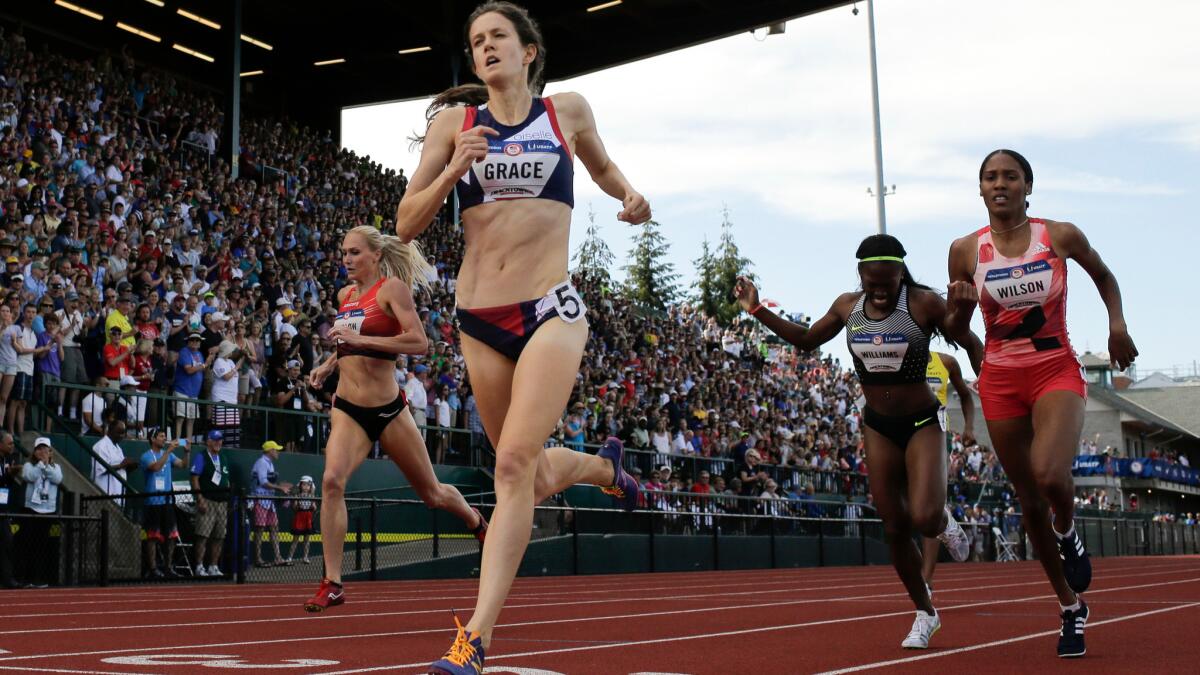Olympics bans most brands from saying ‘Olympics’ or ‘Rio,’ even on Twitter. Snark ensues

- Share via
At the Olympics in Rio de Janiero, athletes from around the world are posting tweets, photos and observations between training and competing.
Missing from their social media updates: any mention of companies that are not part of the exclusive club of official Olympic sponsors.
That’s because of Rule 40, a section of the Olympic Charter that bars such businesses from mentioning the Olympics or the athletes they sponsor in any way from July 27 to Aug. 24. Athletes are likewise not allowed to acknowledge their sponsors during that period.
The rule extends to social media, where banned words include the wholly expected (such as “Olympics,” “medal” and “Rio”) and the vague (including “performance, “challenge” and effort”). Companies aren’t even allowed to retweet news stories about the Olympics.
It’s an effort to protect official sponsors, such as McDonald’s, Coca-Cola and Nike, which pay handsomely for the privilege of exclusive marketing during the Olympics. Official sponsorships can reportedly cost as much as $200 million, and such deals amount to more than 40% of Olympic revenues, according to the International Olympic Committee.
But comparatively few Olympic athletes hold contracts with official sponsors. Many afford a lifestyle of training and competing through deals with smaller brands, which are shut out from even mentioning the athletes during the few weeks when casual sports fans might care about hurdlers or modern pentathletes.
This year, however, companies and athletes are harnessing social media to fight back.
Some Olympians have tried to highlight the silliness of barring athletes from digital free speech.
“How amazing is this!” tweeted Jade Lally, a British discus thrower, after posting a photo of a good luck card. “It’s for that thing [winking face emoji] I’m doing this summer [winking face] in South America [winking face] #Rule40”
Brooks Running Co., which sponsors a dozen athletes competing in the Summer Games in Rio, kicked off a stealth war against Rule 40 this summer on Instagram and Twitter.
The Seattle sportswear company also created a website, rule40.com, that sought to educate people, along with providing slogans that can be posted to social media to mock the rule. During the Olympic track and field trials in July, Brooks hired trucks that drove around Eugene, Ore., with similar messages.
“good luck, you know who you are, on making it you know where,” one reads. Instead of the Olympics, the ad refers to a “generic worldwide quadrennial sporting event.”
Jesse Williams, Brooks’ senior sports marketing manager, said the company came up with the idea last winter after kicking around ways to spotlight how Rule 40 unfairly penalizes athletes who are not famous.
Social media — and the megaphone it gives to fans, athletes and companies alike — was crucial to the strategy, Williams said.
“We knew it was the only place where it was going to come to life and work,” he said. “Even though we had trucks in Eugene, we knew it was going to all lead back to social media.”
Experts said that harnessing social media already has had an impact: A recent relaxation of Rule 40, announced last year by the IOC, was a direct result of athletes speaking out against the rule at the 2012 London Games.
“Social media changes the picture,” said Dominique Hanssens, a marketing professor at the UCLA Anderson School of Management. “It can carry negative messages like protest, and it can be quite impactful.”
Under the more relaxed rules, the IOC this year is allowing companies to run generic ads during the Games. But it comes with many caveats. Marketing can’t refer to the Olympics, and images such as the Olympic rings are off-limits; the campaigns also had to be submitted by January for pre-approval and had to start airing by March, long before Olympic trials are held for many sports.
That means athletes without a famous name — or brands without big advertising budgets — are still left out. Companies that do want to seize on the Olympic furor are more likely to sign up well-known Olympians, said Courtney Brunious, associate director of the Sports Business Institute at USC.
Under Armour, for example, began airing an ad in March starring swimmer Michael Phelps, which made no reference to the Olympics but included music with the lyrics “the last goodbye,” hinting at Phelps’ announcement that Rio would be his last time at the Games.
“You can build a campaign around Michael Phelps without mentioning the Olympics and consumers will understand,” Brunious said. “It does damage the lesser-known athletes because they don’t have that recognition tied in. The sponsors can’t predict a requisite return on investment.”
That’s why Oiselle, a women’s athletic wear company based in Seattle, opted against running ads created this year that were approved by the USOC.
Sally Bergesen, chief executive of Oiselle, said the requirement to run the campaign months before the Olympics started was expensive and “defanged” the power of their message.
“It’s ridiculous. It’s like a surcharge,” Bergesen said. “The only companies that are going to benefit are the ones that have the three or four top household names.”
Bergesen called Rule 40 “a downward cycle” for athletes and businesses. Oiselle sponsors about 30 elite athletes, with four heading to the Rio Games. It costs about $300,000 over four years to nurture an athlete all the way to the Olympics — an expense that many companies will find hard to swallow without the possibility of utilizing the Games in campaigns, she said.
“It’s a Catch-22,” Bergesen said. “Without the visibility you won’t get the sponsors; without the sponsors the athletes won’t get paid.”
It’s a Catch-22. Without the visibility you won’t get the sponsors; without the sponsors the athletes won’t get paid.
— Sally Bergesen, chief executive of Oiselle
Instead, Bergesen has been extensively blogging about Rule 40 on the Oiselle website, where she refers to the Olympics as “the Big Event in Brazil.” (The company already received a warning letter from the U.S. Olympic Committee after publishing photographs of runner Kate Grace qualifying for the Olympics in July.)
“Everybody is fed up,” she said. “It’s like dress codes at school. People are going to find a way to push the envelope.”
Williams of Brooks Running said he thinks the only — or at least most effective — way to force drastic changes is if a large group of athletes bands together in defying Rule 40. The IOC has said it can bar athletes from competing or even strip away medals for violating the rule, but it would be impossible to throw out a large portion of athletes and still hold the Games.

Competition heated up Wednesday as a few underdogs gave Olympic favorites a run for their money.
Given the doping scandal that has enveloped the IOC this year, the committee may very well want to avoid negative publicity for punishing an athlete who thanked a sponsor, said Brunious of USC.
“The optics for the IOC when it comes to policing Rule 40 versus doping are not great,” Brunious said. It reminds viewers that “maybe the priorities aren’t in places where they should be.”
But for now, athletes who have worked their whole lives to reach the Games are choosing creative ways to acknowledge their sponsors — without technically breaking the rules.
Grace, who is running the women’s 800-meter on Aug. 17, tweeted about Oiselle on July 26, the last day before the blackout kicked in. She pinned the tweet, so it remains at the top spot on her Twitter account.
“major [heart emoji] to @oiselle,” she wrote.
MORE OLYMPICS NEWS
Missy Franklin’s Olympic retrofit ends in bitter disappointment
Plaschke: Gymnast Gabby Douglas resurrects the debate over how to act during the national anthem
Spirits are low at Russia’s Olympics party house, with fans grumbling that doping bans are unfair
More to Read
Inside the business of entertainment
The Wide Shot brings you news, analysis and insights on everything from streaming wars to production — and what it all means for the future.
You may occasionally receive promotional content from the Los Angeles Times.











